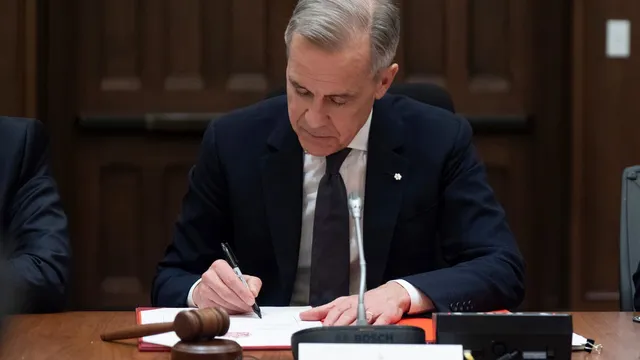
Canada reviews F-35 fighter jet deal amid trade tensions
2025-03-19 06:17- New Prime Minister Mark Carney has requested a review of the F-35 fighter jet purchase
- The review is driven by escalating trade tensions with the United States under President Trump's administration
- The Canadian government is considering alternative options beyond the $19 billion F-35 deal.
Express your sentiment!
Insights
In Canada, a significant review of the multi-billion dollar defense contract is underway. Prime Minister Mark Carney has formally requested Defense Minister Bill Blair examine the purchase of F-35 fighter jets from Lockheed Martin. This review is set against the backdrop of escalating trade tensions between Canada and the United States, particularly due to President Donald Trump's aggressive trade policies and threats of economic coercion. These tensions have incited feelings of resentment among Canadians towards American goods and influenced their perspectives on this crucial defense deal. The $19 billion deal was initially established as a means to modernize the Royal Canadian Air Force, with Canada committing to acquire 88 jets to replace its aging fleet of F-18 aircraft. Despite committing significant resources to this program, recent geopolitical developments and trade disputes have led the Canadian government to reassess whether continuing with the F-35 contract serves the best interests of its national defense strategies. Notably, the review will consider alternatives to the American-made jets. Minister Bill Blair indicated that discussions with military officials are ongoing to evaluate whether a mixed fleet of aircraft might better serve the nation’s defense needs. He is exploring options including the potential for assembly and maintenance of fighter jets in Canada, which could strengthen domestic industrial capabilities amidst rising discontent regarding reliance on American defense systems. This reconsideration comes in light of not only Canada's difficulties with U.S. trade policies but also Portugal's similar reevaluation of its acquisition of F-35s, reflecting a broader uncertainty surrounding reliance on American military technology in an increasingly unpredictable international landscape. Ultimately, while the contract remains active, the Canadian government’s focus seems to have shifted toward ensuring that it fully meets the evolving needs of the Canadian Armed Forces without jeopardizing its economic relationship with the United States.
Contexts
The US-Canada trade landscape has been undergoing significant changes, particularly in the realm of defense contracts. As both nations have historically shared a strong economic relationship bolstered by agreements such as the North American Free Trade Agreement (NAFTA), recent tensions due to trade disputes have raised questions about the sustainability of this collaboration. The ongoing trade war has prompted concerns regarding the financial implications for defense contractors and the overall impact on national security for both countries. Analyzing these factors is crucial in understanding the effect of trade policies on defense procurement and collaboration between the United States and Canada. With the imposition of tariffs and trade restrictions, Canadian and American defense contractors face increased costs that may hinder their competitiveness in the global market. Canadian defense firms, which rely heavily on exports to the US, are particularly vulnerable to these policies. The ripple effect of such economic conditions could lead to reduced joint projects and less collaborative research and development efforts, ultimately hampering innovation in defense technologies. Moreover, a shift in focus towards self-sufficiency may emerge as contractors seek to minimize dependence on foreign markets, further complicating cross-border partnerships. The trade war has also raised questions regarding the alignment of defense strategies between the two nations. Historically, Canada has been viewed as a vital ally to the United States, participating in numerous defense initiatives and joint exercises. However, increasing tariffs and heightened regulatory scrutiny may lead to a cooling of this relationship, risking perceived reliability and integration of defense operations. To mitigate these risks, stakeholders must prioritize clear communication and transparency in the defense procurement process, ensuring that both governments remain committed to upholding their cooperative history while addressing trade grievances. In conclusion, the impact of the US-Canada trade war on defense contracts is profound, influencing both economic factors and strategic military alliances. As both nations navigate their positions, it is imperative that they seek common ground to foster cooperation despite existing tensions. Future policies should aim to reduce barriers and encourage collaboration, ensuring that defense mechanisms are not compromised in the face of trade disputes. The integrity of North American defense must remain a priority, as a strong partnership is essential for maintaining security and responding to evolving threats in an increasingly complex global landscape.